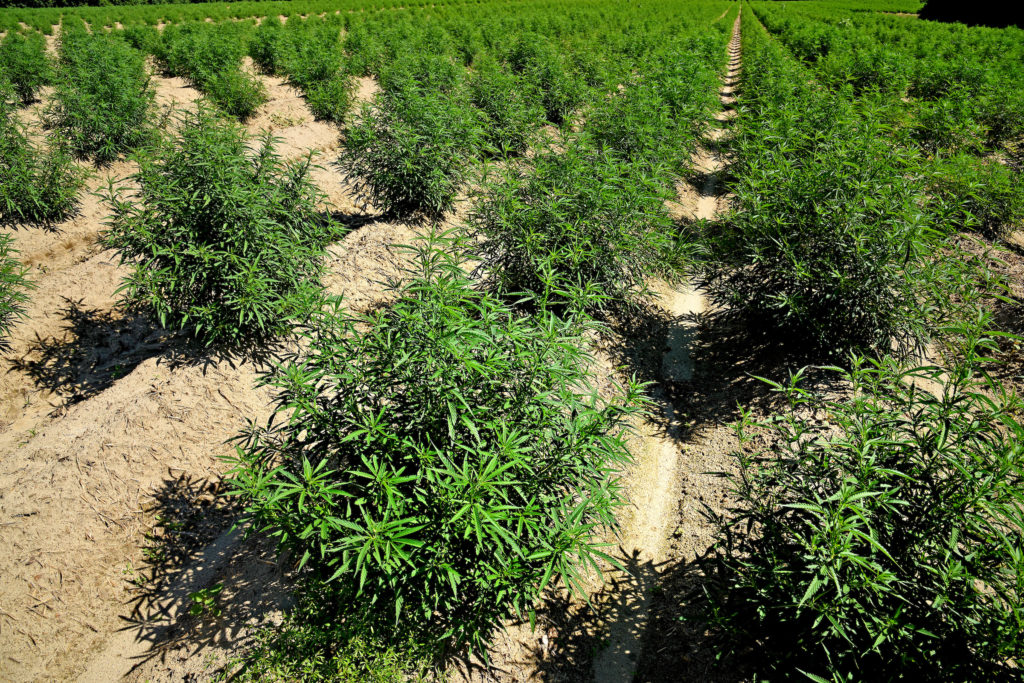Hemp 101: A Beginner’s Guide to an Emerging Crop
go.ncsu.edu/readext?615062
en Español / em Português
El inglés es el idioma de control de esta página. En la medida en que haya algún conflicto entre la traducción al inglés y la traducción, el inglés prevalece.
Al hacer clic en el enlace de traducción se activa un servicio de traducción gratuito para convertir la página al español. Al igual que con cualquier traducción por Internet, la conversión no es sensible al contexto y puede que no traduzca el texto en su significado original. NC State Extension no garantiza la exactitud del texto traducido. Por favor, tenga en cuenta que algunas aplicaciones y/o servicios pueden no funcionar como se espera cuando se traducen.
Português
Inglês é o idioma de controle desta página. Na medida que haja algum conflito entre o texto original em Inglês e a tradução, o Inglês prevalece.
Ao clicar no link de tradução, um serviço gratuito de tradução será ativado para converter a página para o Português. Como em qualquer tradução pela internet, a conversão não é sensivel ao contexto e pode não ocorrer a tradução para o significado orginal. O serviço de Extensão da Carolina do Norte (NC State Extension) não garante a exatidão do texto traduzido. Por favor, observe que algumas funções ou serviços podem não funcionar como esperado após a tradução.
English
English is the controlling language of this page. To the extent there is any conflict between the English text and the translation, English controls.
Clicking on the translation link activates a free translation service to convert the page to Spanish. As with any Internet translation, the conversion is not context-sensitive and may not translate the text to its original meaning. NC State Extension does not guarantee the accuracy of the translated text. Please note that some applications and/or services may not function as expected when translated.
Collapse ▲Industrial hemp has been a hot topic in the news lately and rightly so. I will attempt to address some of the questions that I have been receiving regarding hemp production in this article to give folks a practical knowledge about this unfamiliar crop they may be seeing grown around the county. This is in no way an exhaustive look at industrial hemp production or the legislation behind it, but rather think of this as an introductory Hemp 101 course.
Both industrial hemp and marijuana belong to the Cannabaceae family, which also includes hops. Marijuana and industrial hemp are varieties of cannabis that were developed by selective breeding for different traits. Marijuana is bred for its mind-altering psychoactive compounds; industrial hemp for its CBD oil and many other commercial properties. Marijuana that is smoked for the high usually contains at least 10% THC (tetrahydrocannabinol) or more. By law, industrial hemp must contain 0.3% THC or less. Therefore, THC in industrial hemp is almost non-existent and will not cause an individual to achieve a “high.”
Cannabinoids are a group of chemical compounds found in cannabis that interact with certain receptors in the brain. There are at least 113 classes of cannabinoids that have been identified; these include but are not limited to THC, cannabinol (CBN) and cannabidiol (CBD). Cannabinoids are mainly produced in the trichome glands in the flowers of the female cannabis plant. The presence of male plants during reproductive growth can cause female plants to produce seed and drastically decrease CBD oil production.
Many people ask me if they can grow hemp. The short answer is no. You must be licensed through the North Carolina Department of Agriculture & Consumer Services N.C. Industrial Hemp Research Pilot Program. It requires a copy of a Schedule F from your tax return, providing proof of agricultural income receipts. Basically, you must be a bona fide farmer that makes a significant part of your income through production agriculture to become certified to grow industrial hemp. You must also provide GPS coordinates of where your hemp is grown and stored. Any hemp found in an undisclosed area, as well as having THC content greater than 0.3% may result in seizure and destruction of your crop by NCDA&CS and/or law enforcement. All requirements can be found on the NCDA&CS website.
Once a farmer has obtained a license, he or she must obtain plants or seed to plant in the field. At this time, the most common method of planting is from clones, or cuttings from “mother” plants in the greenhouse. Significant work is being done in our region to make planting from seed a more viable option.
Hemp is a very costly crop to grow with labor being one of the most significant costs. There are no synthetic pesticides currently labeled for use on hemp, thus making weed, insect and disease control very labor intensive. A great deal of time and labor is also spent identifying male plants in greenhouses and fields. As mentioned above, the presence of male plants will drastically reduce CBD oil production in female plants.
Hemp harvest labor is also very costly. Historically, hemp has been harvested by hand and hung in a barn to air dry. This is a slow and inefficient process. Many farmers are taking a more mechanized approach, using modified tobacco strippers and tobacco bulk barns for more efficient harvest and drying. Once dried, the hemp is delivered to a processing facility.
I would like to stress that ingesting industrial hemp will not cause a high as these plants are used for the specific purpose of CBD oil production and sometimes fiber, and are different than the plant strains that contain a high THC content. Do not attempt to sample or remove hemp that you may see growing in a greenhouse or field. This can be considered trespassing or theft and could be grounds for legal action by the farmer or landowner against any violator. For further information regarding industrial hemp or any other agriculture-related questions, please contact me at my office.
Mitchell Williams is Agriculture Agent – Field Crops and Livestock for North Carolina Cooperative Extension in Lee County.





